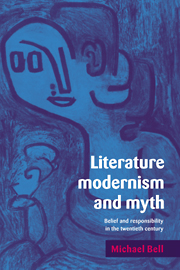7 - Living without myth: deconstructing the old world
Published online by Cambridge University Press: 18 December 2009
Summary
BELIEVING IN THE ALLEGATORS: THOMAS PYNCHON AND URBAN LEGEND
The Latin American writers just considered effect a critique of myth from the inside. Their myths are regionally specific rather than arising from the sheer fact of conscious being in the world, which was the characteristically modernist implication, and they see the necessity of understanding them diagnostically, yet, by the same token, they also see them as part of an historical identity. Their way of being half inside and half outside their myths allows them to make positive literary use of mythopoeic possibility, even if this has occasionally led to sentimental readings which miss their actual toughness and complexity. But the directly mythopoeic aftermath of European and American modernism has been characteristically different.
The disintegration of the realist mode in fiction after about 1880 did not arise, as is sometimes claimed, from some literalistic naivety in the form itself, but from the increasingly evident lack of a cultural consensus to underwrite it. Systems of belief which we do not share are thereby exposed, in the market-place, debunking sense, as myths. The modernist generation found a radical solution to this. Rather than naturalise their own projected significances within the narrative texture, they made the inescapable foundation in shared belief and values fully conscious. Myth itself became the most fundamental kind of truth claim. What distinguishes modernist mythopoeia, therefore, is not just the central use of myth, but its according to myth the ultimate metaphysical value. Myth was a mediating term between history and fiction in the modernist decades.
- Type
- Chapter
- Information
- Literature, Modernism and MythBelief and Responsibility in the Twentieth Century, pp. 199 - 222Publisher: Cambridge University PressPrint publication year: 1997



